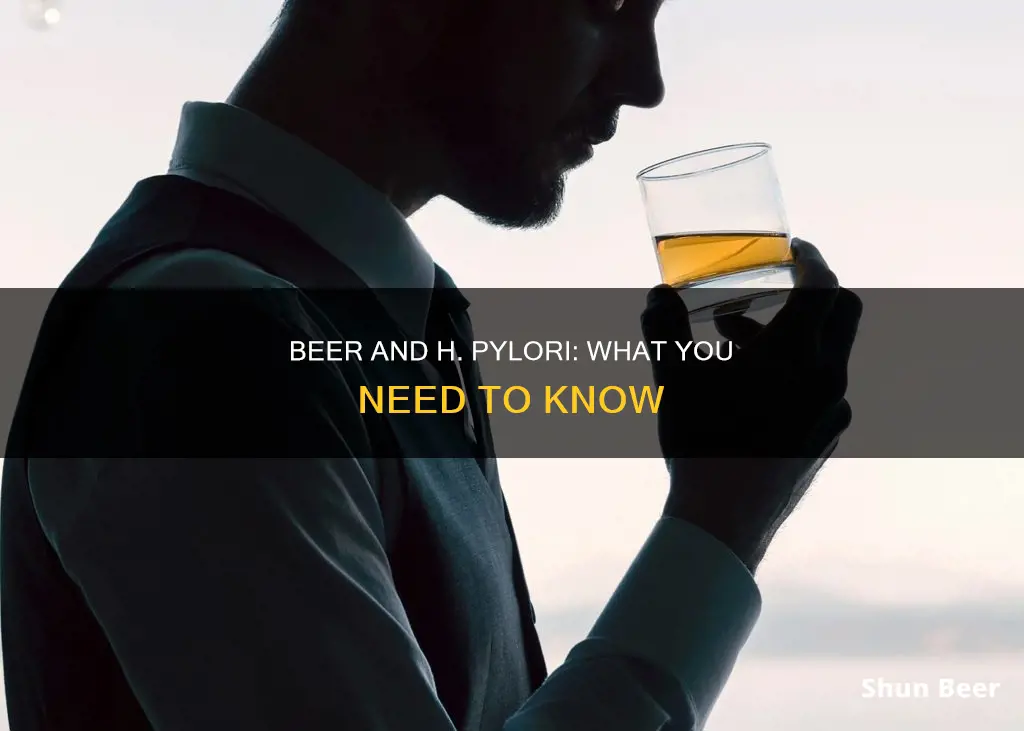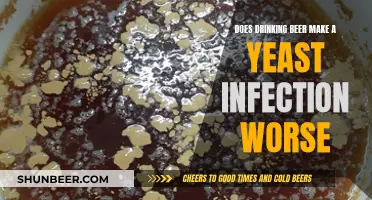
Alcohol consumption has been found to have a complex relationship with the prevalence of H. pylori infections. Some studies have found that alcohol consumption may have a protective effect against H. pylori infection, with moderate alcohol consumption potentially facilitating the spontaneous elimination of the infection in adults. However, other studies have found no such protective effect, and it has been suggested that alcohol consumption may increase the risk of gastric cancer in individuals who are not infected with H. pylori. Furthermore, alcohol consumption has been found to increase the failure rate of H. pylori eradication treatments, particularly in Asian populations.
| Characteristics | Values |
|---|---|
| Alcohol consumption and H. pylori infection | Alcohol has antimicrobial activity and stimulates gastric acid secretion. |
| Alcohol consumption may compromise the living conditions of H. pylori in the stomach. | |
| Moderate alcohol consumption may facilitate the spontaneous elimination of H. pylori infection in adults. | |
| Alcohol consumption may have a protective effect against H. pylori infection. | |
| Alcohol consumption increases treatment failure for H. pylori eradication in Asian populations. | |
| Heavy and binge alcohol consumption is a risk factor for gastric cancer in people not infected with H. pylori. |
What You'll Learn

Alcohol consumption and H. pylori infection rates
Alcohol consumption has been found to have a strong antimicrobial effect on the H. pylori infection rate in adults. A study by Brenner et al. found a clear inverse dose-response relation between reported alcohol consumption and H. pylori infection. The study's results supported the hypothesis that moderate alcohol consumption may facilitate the spontaneous elimination of H. pylori infection among adults.
However, it is important to note that the link between alcohol consumption and H. pylori infection rate is complex and may vary depending on various factors, such as region, treatment regimen, and alcohol type. For example, a meta-analysis by Xiaoyong Wang et al. found that alcohol consumption increased the risk of H. pylori eradication failure in Asian populations, particularly with specific treatment regimens and alcohol intake above 40 g/day.
Furthermore, the impact of alcohol consumption on H. pylori infection rate may also be influenced by the presence of other risk factors, such as smoking and coffee consumption. While alcohol consumption may reduce H. pylori infection rates, it is essential to consider the potential health risks associated with alcohol consumption, as excessive alcohol intake can lead to various health issues.
In summary, while moderate alcohol consumption may facilitate the elimination of H. pylori in adults, it is important to consider the potential health risks associated with alcohol consumption, and individuals should always consult with a healthcare professional for personalized advice regarding alcohol intake and H. pylori infection.
Exploring Beer Drinking Rules in National Parks
You may want to see also

Alcohol's antimicrobial activity against H. pylori
Alcohol has antimicrobial properties and can destroy bacteria and viruses through a process known as denaturation. This is when alcohol molecules break down the proteins in the structure of germs, causing the cells to lose their membrane protection, become dehydrated, and die.
The most widely used alcohol-based sanitisers contain ethanol or isopropanol. Ethanol is chemically the same as drinking alcohol, and is more powerful than isopropanol. However, the effectiveness of both depends on the type of microbe being targeted.
Centers for Disease Control and Prevention (CDC) recommends an alcohol concentration of between 60 and 90 percent for disinfection purposes.
Ethanol has been shown to be effective against viruses such as herpes, hepatitis B, HIV, influenza, rhinoviruses, and coronaviruses, among others. It can also eliminate common bacteria, such as E. coli, salmonella, and Staphylococcus aureus.
However, alcohol is not effective against all types of germs. For example, it is ineffective against the viruses that cause hepatitis A or polio.
Alcohol-based sanitisers and disinfectants are not meant to be consumed. They won't destroy pathogens inside your body.
Beer and Drug Testing: What's the Verdict?
You may want to see also

Alcohol's effect on gastric acid secretion
Alcohol has a strong antimicrobial activity and stimulates gastric acid secretion. Pure ethanol in low concentrations (less than 5% volume/volume) is a mild stimulant for acid secretion, while higher concentrations have no effect or are mildly inhibitory. Alcoholic beverages with low ethanol content, such as beer and wine, strongly stimulate gastric acid secretion and gastrin release. The effect of beer is equal to the maximal acid output. Beverages with higher ethanol content, such as whiskey, gin, and cognac, do not stimulate gastric acid secretion or the release of gastrin. The stimulants in beer that cause this effect are yet to be identified, but they are thermostable and anionic polar substances.
Chronic alcohol abuse can lead to normal, enhanced, or diminished acid secretory capacity in patients. There is a lack of research on the acute effects of alcohol consumption on gastric acid secretion in chronic alcoholic patients. However, it is hypothesized that moderate alcohol consumption may facilitate the spontaneous elimination of H. pylori infection in adults.
Lovastatin and Beer: A Safe Mix?
You may want to see also

Alcohol's impact on H. pylori treatment
Alcohol consumption has been found to have a significant impact on the treatment and eradication of H. pylori infections. While some studies suggest that moderate alcohol consumption may facilitate the spontaneous elimination of H. pylori, others indicate that alcohol intake increases the risk of treatment failure.
Alcohol has antimicrobial properties and stimulates gastric acid secretion, which can compromise the living conditions of H. pylori in the stomach. A study by Brenner et al. (1999) found a clear inverse dose-response relationship between reported alcohol consumption and H. pylori infection, suggesting that moderate alcohol consumption may facilitate the spontaneous elimination of H. pylori infection in adults. However, it is important to note that the relationship between alcohol consumption and H. pylori infection may be complex and influenced by various factors.
A meta-analysis by Wang et al. (2023) investigated the effect of alcohol on the risk of H. pylori eradication failure. They found that alcohol intake was associated with a higher risk of eradication failure, especially in Asian populations. The analysis showed that alcohol consumption of more than 40 grams per day was associated with a higher risk of treatment failure. Additionally, the type of treatment regimen also played a role, with higher failure rates observed when the duration of therapy was more than 7 days, when the regimen included nitroimidazoles, and when patients were treated with bismuth-containing quadruple therapy.
The impact of alcohol consumption on H. pylori eradication may vary depending on the region and the specific treatment regimen used. Wang et al. (2023) suggested that drinkers should abstain from alcohol to improve the H. pylori eradication rate, especially in Asian populations. Additionally, they found that a vonoprazan (VPZ)-based therapy regimen can prevent the negative impact of alcohol on treatment efficacy.
It is worth noting that the relationship between alcohol consumption and H. pylori infection may also influence the development of gastric cancer. A study by Ma et al. (2015) found that heavy and binge drinking were associated with an increased risk of gastric cancer in individuals not infected with H. pylori. However, no significant association was found between drinking patterns and gastric cancer risk in H. pylori-infected subjects.
Mixing Beer and Muscle Relaxers: What You Need to Know
You may want to see also

Alcohol consumption and gastric cancer risk
Alcohol consumption has been found to have multiple direct and indirect effects on the gastric mucosa, gastric emptying, and acid secretion. It is also known to have antimicrobial properties. The relationship between alcohol consumption and Helicobacter pylori-related gastric diseases is inconsistent and conflicting.
Heavy and binge drinking are important risk factors for the development of gastric cancer in populations not infected by H. pylori. The risk of gastric cancer increases with the frequency and duration of alcohol consumption. The mechanisms responsible for the carcinogenic effects of alcohol consumption on gastric cancer are not yet fully understood. However, studies suggest that ingested alcohol can cause direct and indirect dose-dependent mechanical damage to the gastric epithelium. Alcohol intake increases acid secretion in the stomach, which leads to gastric mucosal damage. It has also been associated with the generation of reactive oxygen species and other free radicals, inorganic arsenic, preservatives, and additives, which can promote carcinogenesis.
In a study of 949 participants from the Korean Multi-center Cancer Cohort (KMCC), heavy drinking (≥7 times a week) and binge drinking (≥55 g alcohol intake per occasion) showed a 3.48-fold and 3.27-fold higher risk of gastric cancer, respectively, in subjects not previously infected by H. pylori. There was no significant association between drinking patterns and gastric cancer risk in H. pylori IgG seropositive subjects.
In another study, alcohol consumption was found to increase the risk of treatment failure for H. pylori eradication in Asian populations. A higher daily alcohol intake was associated with a higher risk of treatment failure, with alcohol intake of >40 g/day being linked to H. pylori eradication failure.
Alcohol consumption is associated with an increased risk of gastric cancer, particularly in individuals not infected with H. pylori. Abstaining from alcohol can help lower the risk of gastric cancer, especially in those who are not infected with H. pylori.
Beer and Wine Mixing: A Good Idea?
You may want to see also
Frequently asked questions
Alcohol consumption may compromise the living conditions of H. pylori in the stomach due to its antimicrobial activity and stimulation of gastric acid secretion. However, studies have shown that moderate alcohol consumption may facilitate the spontaneous elimination of H. pylori infection in adults. Therefore, while excessive alcohol intake can increase the risk of H. pylori infection, moderate consumption may have protective effects.
Alcohol consumption has been associated with an increased risk of treatment failure for H. pylori eradication, especially in Asian populations. Higher daily alcohol intake and longer treatment durations further contribute to this risk. Therefore, it is generally recommended to abstain from alcohol during H. pylori treatment to improve eradication rates.
Heavy and binge drinking have been linked to an increased risk of gastric cancer in individuals who are not infected with H. pylori. Alcohol consumption can cause direct and indirect damage to the gastric epithelium, increase acid secretion, and generate reactive oxygen species, which can promote carcinogenesis. Therefore, excessive alcohol intake may worsen H. pylori-related gastric diseases and increase the risk of associated complications.







